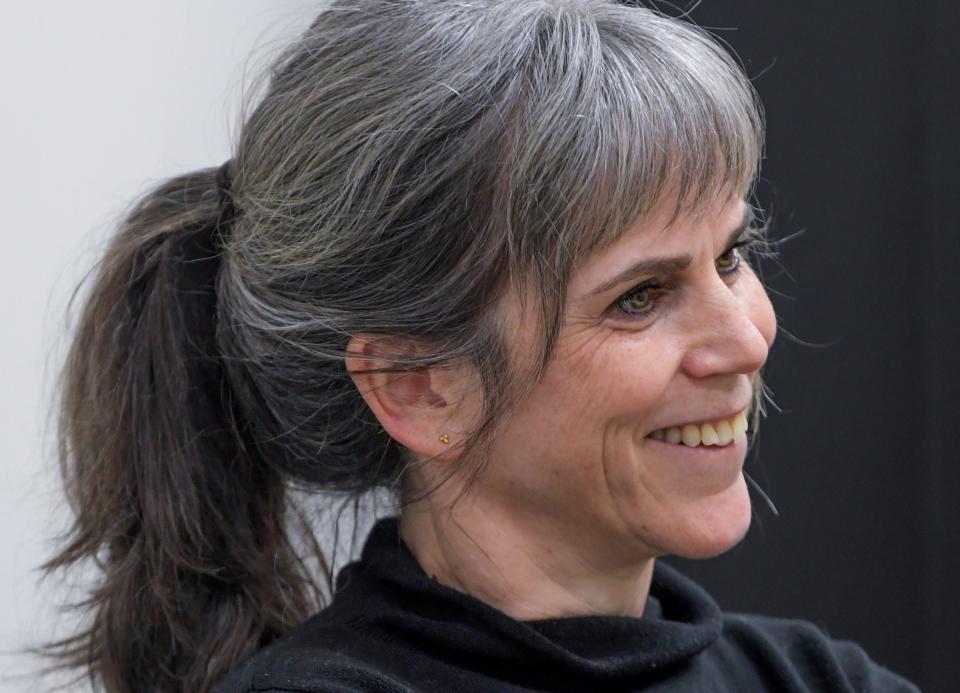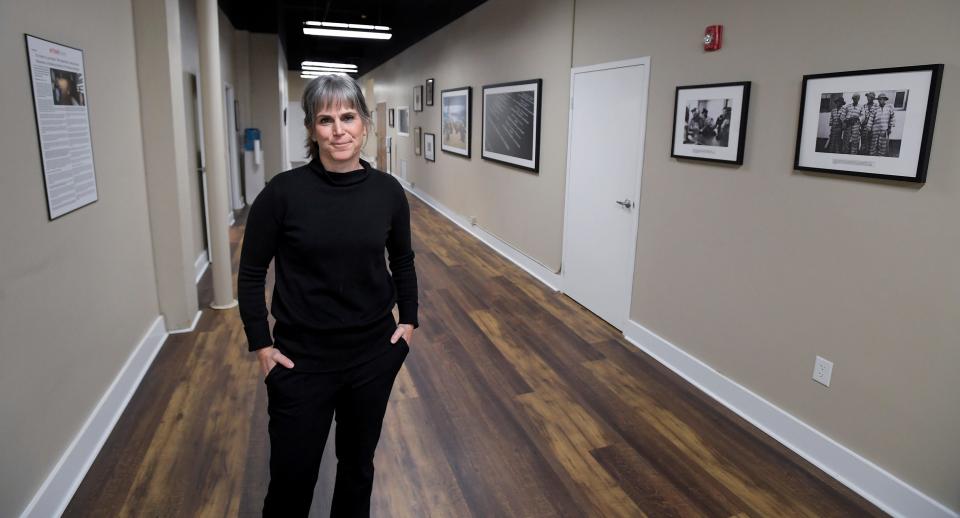Indifference to prison violence 'will change us,' EJI's Charlotte Morrison says
- Oops!Something went wrong.Please try again later.
Charlotte Morrison could have been an attorney just about anywhere. When she entered the job market, she had a graduate degree in philosophy from the University of Oxford, a law degree from one of America’s top law schools and a prestigious federal clerkship. That resume would’ve gotten her a desk at any of the biggest firms in the country.
But thanks to a little bit of fate, she wound up in Montgomery.
As a first-year law student at N.Y.U., she took a class from one of the school’s new faculty members, a man who had recently started a nonprofit to defend those on death row after Congress eliminated death penalty defense funding: Bryan Stevenson.

It was during that class, Morrison said, that she was able to make sense of the things she’d been struggling to work out. Things like how the justice system looks for a clean narrative of perpetrator and victim, and how it overlooks the needs of both in the process.
She started taking more of Stevenson's classes. Then she started in his legal clinic, and then asked to be a legal fellow at his nonprofit.
By the time she graduated, she knew what she was going to do. In fact, she says she never felt like she had a choice.
“Knowing that there are so many pressing issues that people are dying for help, and to not try to be of service, it wasn’t really a choice. I didn’t feel like I had a choice not to address the problems,” Morrison said.
“It would feel intolerable to me to know this pain exists, this harm is going on, and not respond to it. That would be an intolerable life.”
For 22 years at Montgomery’s Equal Justice Initiative (EJI), Morrison has represented those on death row, the wrongfully convicted and unfairly sentenced. She has also been on the forefront of EJI’s anti-poverty initiatives.
Morrison’s work has led to substantive changes across Alabama’s prisons. Her work investigating and documenting rampant sexual abuse at Julia Tutwiler Prison for Women, for example, was crucial in getting the U.S. Department of Justice involved and reducing rates of violence at the facility.
“As she likely would have distinguished herself in any area of law, she’s distinguished herself here,” said Stevenson, EJI’s founder and executive director.
Morrison has been named the Montgomery Advertiser’s Community Hero for May for her contributions to improving Alabama’s criminal justice system and the Montgomery community. The honor is sponsored by South University.
Stevenson said Morrison was an “excellent choice” for the honor.
“As an advocate, she really values helping people who are in great need,” he said. “I think she has a heart for the poor, marginalized and vulnerable. I think she is rewarded by standing with people who have been excluded and disfavored and fighting for their rights.”
Morrison was born into a working-class family that moved around until she was in about fifth grade. The family settled in the logging town of Whitefish, Montana, as the timber industry was declining there.
Her parents ran an automotive shop. She worked in the shop growing up, and she said that’s when she developed her work ethic and inclination to finding practical solutions to problems.
She attended the University of Montana, where she studied philosophy and got an assistant teaching position in the department. She made new friends that showed her a new appreciation for the outdoors, which she still has today.
One particularly impactful experience during college was her volunteer work at The Women’s Place, an organization that provided support for victims of domestic violence. She found herself conflicted with how the group treated the complex realities that the women lived in.
The organization treated things as black and white: There were victims and perpetrators. But the reality, Morrison felt, was always much grayer.

“This sort of easy framework just wasn’t comfortable for me at all,” she said. “That sort of disconnect between reality and this narrative was constantly in tension even for people we were serving, who came from histories of abuse in their families and were trying to figure out how to address that ongoing cycle.”
That conflict between an easy narrative and a more complex reality kept nagging at her.
While her time at the University of Oxford as a Rhodes Scholar was enriching, she never got a chance to explore that tension she felt.
That academic environment was too focused on the abstract, and she was interested in the practical side.
So, when she looked at law schools, she knew she wanted to go somewhere that would enable her to make a real, practical difference. She settled on N.Y.U. because of its focus on social justice and clinical programs.
In Stevenson’s death penalty class, she finally learned about something that addressed that tension she was struggling with.
It was the concept of mitigation, which is at the heart of how attorneys think about sentencing, especially in the context of the death penalty.
Morrison sums it up like this: “To understand how to appropriately respond to [harm] as a society — in terms of what the punishment should be, how you restore that person to society — you have to understand that person’s life history to have any response that looks like justice.”
Morrison, like many on EJI’s staff, was initially focused on representing those on death row or with life sentences. But her scope expanded, and Morrison has led the organization’s efforts challenging the conditions of Alabama’s prisons.
She’s developed extensive knowledge of what goes on in those prisons.
“She’s absolutely, I think more than anyone in the state, become an expert on conditions of confinement here in Alabama,” Stevenson said.
It’s taxing work. But the way Morrison sees it, we can’t just pretend it isn't happening.
“Our indifference to violence there, it will change us. It will change us as a community, it will change us as a country,” Morrison said.
And things can get worse.
“We don’t think that we accept punishment that is torturous, but we’re changing in terms of what we’re accepting,” Morrison said.
Change won’t come with just attorneys. It requires people stepping in before the justice system is involved. That’s something anyone can do in their community — whether you’re a teacher, whether you help with your kids’ Girl Scout troop, as Morrison does, or whether you’re just a good neighbor.
“How do we bring hope? How can we get to that hopeful place as a community?” Morrison asked. “I think in every job there is some way of serving the community and serving hopefulness.”
Evan Mealins is the former justice reporter for the Montgomery Advertiser. He now covers justice issues for the Tennessean. Contact him at emealins@gannett.com or follow him on Twitter @EvanMealins.
Your subscription makes our journalism possible. Subscribe today.
This article originally appeared on Montgomery Advertiser: EJI attorney Charlotte Morrison is Community Hero for May 2023

